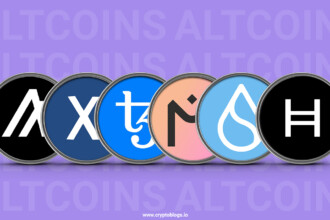Bitcoin does not require an introduction, as most people on our planet are not familiar with it. It has made many people wealthy; on the flip, it made many people cry. However, for people who have never heard this word before or know little about it, this article will help them understand the mechanism and gain insight into the Bitcoin ecosystem.
“In a world of uncertainty, Bitcoin is a beacon of trust and security.”-This philosophy inspires the concept of Bitcoin. The traditional financial system has been eroded and become a tool of oppression for governments and financial institutions. Bitcoin ecosystem offers a new kind of trust built on transparency and decentralization. There’s famous slang often used in the world of cryptocurrency: “don’t trust, verify”. Now, without further ado, let’s dive straight into our topic.
What is Bitcoin?
Bitcoin is the first cryptocurrency built upon a decentralized network that enables peer-to-peer transactions without any intermediary entity like banks or financial authorities. Bitcoin was introduced in 2008 and launched in 2009 by an unknown entity under the pseudonym of Satoshi Nakamoto.
Note that “BTC” is an abbreviation for Bitcoin cryptocurrency.
Bitcoin is a decentralized digital currency designed to function as a peer-to-peer electronic cash system. It aims to provide an alternative to traditional currencies by offering secure, transparent, and borderless transactions without intermediaries. A limited supply and a decentralized ledger give individuals direct ownership and control over their funds, fostering financial autonomy and reducing the risks of inflation and fraud associated with centralized systems.
Bitcoin promises reduced transaction fees than existing online payment methods and is controlled by decentralized computer networks. Banks or governments do not issue or support it, and a Bitcoin transaction has no monetary value.
Although not legal cash, it is trendy and has inspired many other cryptocurrencies like Ethereum.
Who Created Bitcoin?
Beyond his reputation as a founder, Satoshi Nakamoto is crucial to the Bitcoin ecosystem. Although the individual’s identity is still unknown, Satoshi Nakamoto is mysteriously known to be the one. Nakamoto’s wallets have 980,000 bitcoins (about $6.2 billion as of March 2020). Several people have been suggested as Satoshi Nakamoto, but none has been proven to be Satoshi Nakamoto beyond a reasonable doubt.
Satoshi Nakamoto introduced bitcoin to early-stage developers via its Whitepaper. He built a community at “Bitcoin.org” where people can work on its improvements and proposals.
However, decisions are only made by the worldwide supporting community. Technically, nobody owns a Bitcoin network; it’s distributed worldwide and has a mechanism to incentivize network participants Via Bitcoin.
Three Potential Candidates Are Listed Below
The desperate attempt to reveal bitcoin’s creator was Dorian Nakamoto, who could have been the currency’s founder by Newsweek in March 2014. Because of their vast similarities, both were said to have libertarian leanings and had ties to Japan. Although later Dorian Nakamoto said that “he got nothing to do with it”.
Another individual named Craig Wright, an Australian scientist also came into the scenario due to his qualifications and numerous contributions. Also, his comment claiming “a bit of everything” even raised a few eyebrows.
Finally, a computer engineer and legal scholar, Nick Szabo, is credited for proposing the concept of smart contracts in a 1996 paper. Another hint is that Szabo and Satoshi mention Carl Menger, an economist. This strongly suggests to the author that Nick Szabo is Satoshi Nakamoto.
Satoshi Nakamoto is probably not his real name; it is his pseudonym. Satoshi could be a single person or a group of people.
How Does Bitcoin Work?
At its core, Bitcoin works like a digital ledger called the blockchain that keeps track of who owns how much. The ledger comprises blocks, each containing a list of transactions. Imagine it as a public list of who sent and received Bitcoin.
Instead of a single company or bank controlling this ledger, many computers worldwide work together to maintain it. These computers are called nodes. These nodes check and verify transactions to make sure they’re legitimate.
To make a Bitcoin transaction, you need a digital wallet. It’s like your personal digital bank account. Each wallet has a unique address, similar to an email address. When you want to send Bitcoin to someone, you create a transaction and sign it with your wallet’s secret key. This proves that you own the Bitcoin and can spend it.
Once a bunch of transactions are verified, they’re grouped into a block. But here’s the catch: Nodes must solve a complex mathematical puzzle to add a block to the blockchain. This process, called mining, requires a lot of computing power. The first node to solve the puzzle gets to add the league and is rewarded with new Bitcoins for their effort.
Because mining is challenging and takes time, it secures the system. It’s hard to fake transactions because you’d need to control more than half of all the mining power, which is incredibly difficult and expensive.
Bitcoin also has a built-in rule: there will only ever be 21 million Bitcoins. This scarcity is designed to prevent inflation. As more people want Bitcoin, its value might increase, similar to how limited edition items become more valuable.
In simple terms, Bitcoin is like digital money recorded in a public ledger. It’s maintained by many computers worldwide, and complex math problems secure transactions. It gives people more control over money and a new way to send and receive funds globally.
Benefits of Bitcoin
- Decentralization: Bitcoin operates on a decentralized network, free from control by governments or central authorities.
- Security: Bitcoin’s blockchain technology is highly secure, making it resistant to fraud and hacking.
- Transparency: All Bitcoin transactions are recorded on a public ledger, providing transparency and reducing the risk of corruption.
- Limited Supply: Bitcoin’s fixed supply of 21 million coins creates scarcity, potentially preserving value over time.
- Accessibility: Bitcoin can be accessed and used by anyone with an internet connection, bridging financial inclusion gaps.
- Global Transactions: Bitcoin facilitates international transactions quickly and with lower fees than traditional banking systems.
Also, with its borderless nature and low transaction costs, Bitcoin offers gig workers a faster and more efficient way to send and receive payments. Platforms like immediateconnectapp.org have capitalized on this trend, providing freelancers and gig workers with a user-friendly interface to transact in Bitcoin seamlessly.
Is Bitcoin Safe?
Regardless, Bitcoin payments are the most secure and transparent form of digital payments. One can quickly verify the transaction through transaction history from the particular crypto wallet. However, one should know crypto scams and check the platform’s authenticity before initiating trades.
Although Bitcoin technology is primarily safe, risks are still to consider before investing.
Furthermore, one should store their private key safely to keep backup. This will help to recover the crypto wallet in case it is lost or stolen.
Is Bitcoin legal?
The legal status of Bitcoin and other cryptocurrencies varies from country to country. While some countries have embraced and regulated cryptocurrencies, others have taken a cautious or restrictive approach, and a few have outright banned their use. However, regulations and policies can change quickly, so it’s important to verify the current status.
Major countries like the U.S., India, and Russia has no legal restriction on Bitcoin payment; on the other hand, China announced a blanket ban on crypto payments, including Bitcoin, in 2021.
Bitcoin is legal in the US and was listed as a convertible decentralized cryptocurrency by the US Treasury in 2013. However, cryptocurrency is still juggling to get placed into the asset category between security and commodities.
In South Korea, bitcoin is legal. Cryptocurrency trading is restricted to minors as well as outsiders. Only adults in South Korea can transact on registered exchanges using their actual information.
China doesn’t consider cryptocurrency as legal tender, and its banking sector does not acknowledge it.
Currently, in India, bitcoin is not illegal. However, India has been through thick and thin over the years. Right from RBI’s ban in 2018 to the news about an imminent law to ban cryptos in 2021. It is undeniable that even after such a stringent environment, India still bags a solid user thanks to being the most populated country.
What Makes Bitcoins Valuable ?
We can compare Bitcoin and cryptocurrencies to fiat currency based on these and other variables. Bitcoin’s supply is finite, whereas governments print them regularly in the case of all other fiat currencies. As a result, BTC has a high value due to its increasing scarcity. This is also why the value of one BTC about multiple currencies skyrockets.
Cryptocurrencies like Bitcoin are not only immensely more “durable” than fiat currency, but they are also safe. Bitcoin is based on a decentralized ledger system that is reviewed for accuracy many times on each individual ledger. This shows that a transaction will only be allowed if all network systems approve it.
Another significant advantage of Bitcoin is its divisibility up to 8 decimal places. For easier transactions, 1 BTC can be split into 0.00000001 bits, each dubbed a “Satoshi”. This is similar to how a US dollar is broken down into cents, whereas none of the fiat currencies has it.
Furthermore, Acceptance by businesses and individuals, its role as a store of value, network effects, speculation, limited accessibility, concerns about fiat currency stability, and periodic Bitcoin halving events all contribute to Bitcoin’s value.
How to Trade Bitcoins?
There are various Bitcoin investment products, and investment vehicles are currently available. Here are some common ways to invest in Bitcoin:
1. Buy and Hold (HODL)
Direct Purchase: The simplest way to invest in Bitcoin is to buy and hold the actual cryptocurrency through a cryptocurrency exchange. You can then store your Bitcoins in a digital wallet. Hardware Wallet: For long-term investment, consider using a hardware wallet to store your Bitcoins securely offline.
2. Exchange-traded funds (ETFs)
Some stock exchanges offer Bitcoin ETFs, which are funds that track the price of Bitcoin. You can buy shares of these ETFs through a brokerage account, giving you exposure to Bitcoin without owning the cryptocurrency directly.
Examples of Bitcoin ETFs include the Purpose Bitcoin ETF (BTCC) and the Grayscale Bitcoin Trust (GBTC).
3. Futures and Options Contracts
You can trade Bitcoin futures and options contracts on various derivatives exchanges. These contracts allow you to speculate on the future price of Bitcoin without owning the underlying asset. Be cautious when trading derivatives, as they can be highly leveraged and involve significant risk.
4. Bitcoin Mining Stocks
Invest in companies involved in Bitcoin mining. These companies own and operate mining hardware to validate transactions and secure the network. The price of Bitcoin may influence the value of their stocks. Example companies include Marathon Digital Holdings (MARA) and Cipher Mining Inc.
5. Crypto Index Funds
Invest in crypto index funds or digital asset funds that offer diversified exposure to multiple cryptocurrencies, including Bitcoin. Professionals manage these funds. Examples include Bitwise 10 Crypto Index Fund and the Grayscale Digital Large Cap Fund.
Also Read : How to Use Bitcoin For Online Payments
Conclusion:
The globe moved away from metal coins and toward paper money. This was possible because financial firms and regulatory organizations at the time pushed for it as the changeover was made possible. They saw the benefits and embarked on a new era in human history that has lasted to this day.
Cryptocurrencies such as Bitcoin are accumulating tremendous value in the expectation of becoming the world’s future form of cash. Despite their highly volatile nature, they offer all the advantages of traditional currencies but lack the approval and regulation of world governments.
Cryptocurrency and Bitcoins will almost certainly follow a similar path in human evolution. Bitcoin can’t be stopped from ushering in a new era of finance if the regulatory authority declares it a valid currency.







